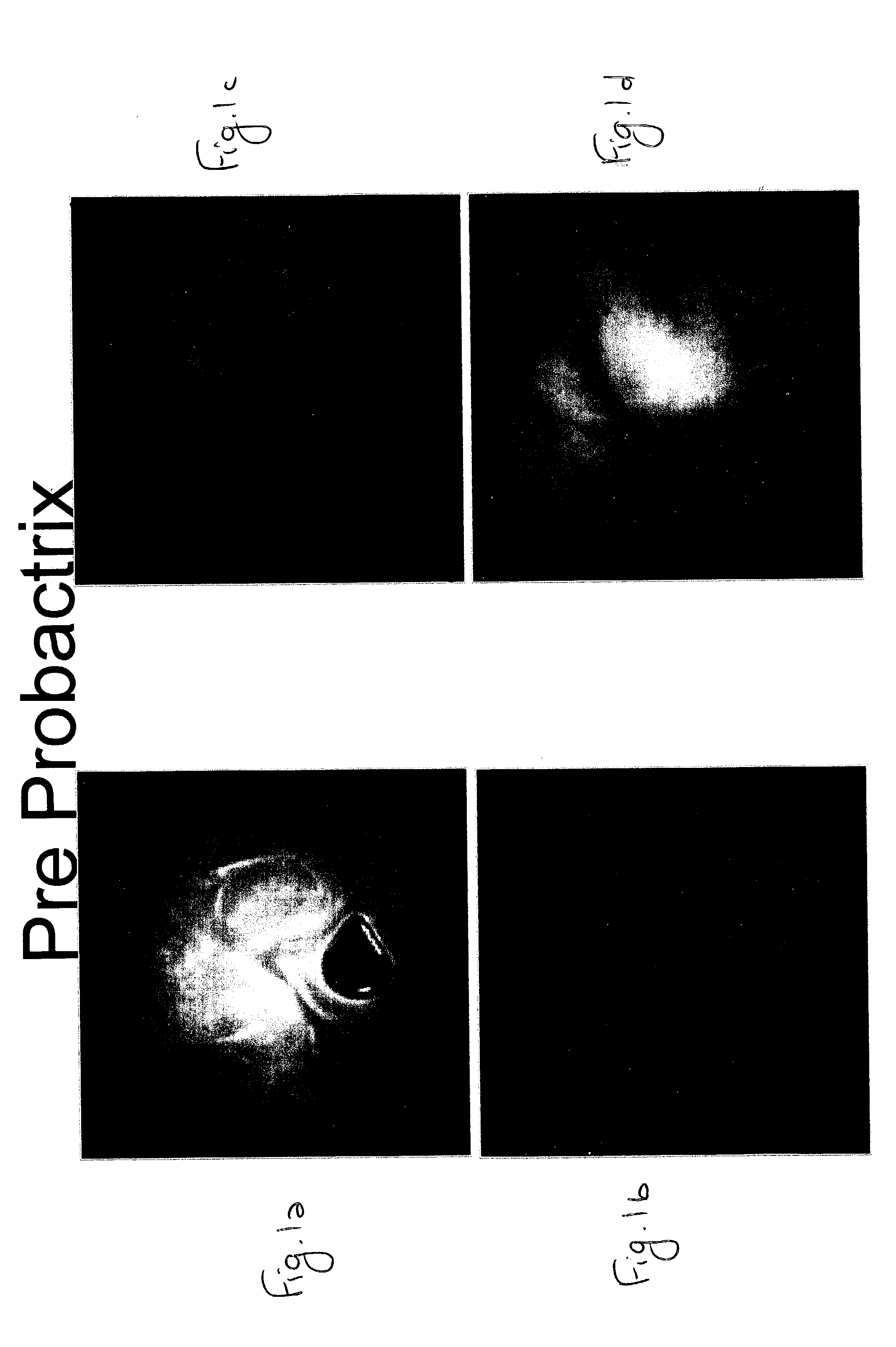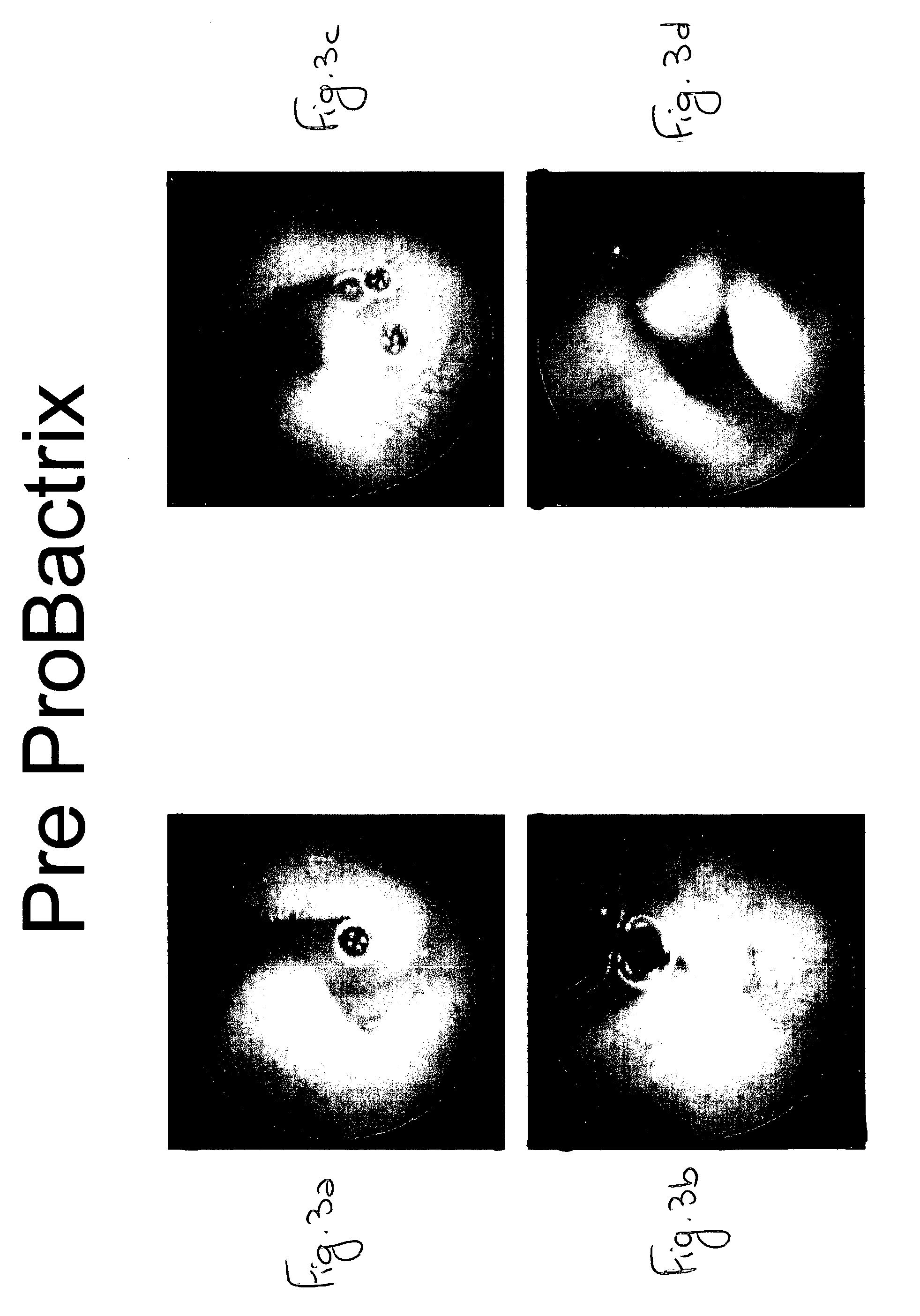Probiotic compositions for the treatment of inflammatory bowel disease
- Summary
- Abstract
- Description
- Claims
- Application Information
AI Technical Summary
Problems solved by technology
Method used
Image
Examples
example 1
Preparation of the Probiotic Composition for Treating IBD
[0081] A representative probiotic composition for treating IBD according to the present invention includes the following components:
[0082] Escherichia coli strain BU-230-98 ATCC Deposit No. 20226 (DSM 12799), also referred to herein as E. coli ATCC 202226, between 10.sup.7 CFU per ml and 10.sup.9 CFU per ml;
[0083] Sodium chloride, about 0.6%; and
[0084] Base Strawberry, about 0.1% in distilled water.
[0085] One hundred bottles, each containing 250 ml of the probiotic preparation described above, were prepared as follows:
[0086] All the operations were performed in a sterile room or in a laminar hood.
[0087] E. Coli cells were grown in four 2 liters Erlenmeyer flasks, each containing 500 ml of a medium consisted of: 10 grams / liter Bacto Soytone (DIFCO), 5 grams / liter Yeast extract (DIFCO), 2 grams / liter Glucose, and 10 grams / liter NaCl, at pH=7.0. The medium was inoculated at about 0.1% of the final OD.sub.650 either from slants or...
example 2
Treatment of Crohn 's Disease Using E. coli (ATCC 202226)
[0090] A 34-year-old male suffering for five months from irregular bowel habits, tenesmus, frequent defacations with passage of mucus and no significant weight loss was studied for the efficacy of E. coli (ATCC 202226) as a therapeutic agent of IBD, as compared to other known IBD drugs. The family history of the patient indicates that his father and three of his siblings suffer from Crohn's disease.
[0091] Laboratory tests of the patient revealed the following: Hemoglobin=17, ESR=4, platelet count of 214, negative serological markers for Celiac disease, negative stool cultures and direct exam, albumin=4.2.
[0092] In a colonoscopy performed by inserting the colonoscope into the distal ileum it was found that the mucosa of the small bowel appeared granular. A biopsy of that area documented some loss of glands. The findings of the colon were normal and a random biopsy of the rectum was normal too.
[0093] The patient was treated with...
example 3
Treatment of IBD-Related Diarrhea Using E. coli (ATCC 202226)
[0098] A 23-year-old male, suffering from loose bowel movements with episodes of diarrhea for two years, and having no rectal bleeding or weight loss, was studied. His family history was unremarkable for bowel disease.
[0099] Laboratory tests of the patient showed the following: Hemoglobin=17.6 (smoker), ESR=10, Platelets=219, Albumin=4.1, tissue transglutaminase TTG=29.8 (normal <20).
[0100] In addition, the patient was found to have lactose intolerance by a positive H2 breath test. However, a diet free of dairy products did not improve his condition.
[0101] The patient's elevated TTG value suggested a diagnosis of Celiac disease. An upper GI endoscopy revealed a normal appearing small bowel. A random biopsy from the second part of the duodenum documented the presence of normal small bowel mucosa. A capsule endoscopy study was preformed and, as is shown in FIGS. 3a-d, revealed inflammatory changes in the proximal small bowel...
PUM
 Login to View More
Login to View More Abstract
Description
Claims
Application Information
 Login to View More
Login to View More - R&D
- Intellectual Property
- Life Sciences
- Materials
- Tech Scout
- Unparalleled Data Quality
- Higher Quality Content
- 60% Fewer Hallucinations
Browse by: Latest US Patents, China's latest patents, Technical Efficacy Thesaurus, Application Domain, Technology Topic, Popular Technical Reports.
© 2025 PatSnap. All rights reserved.Legal|Privacy policy|Modern Slavery Act Transparency Statement|Sitemap|About US| Contact US: help@patsnap.com



